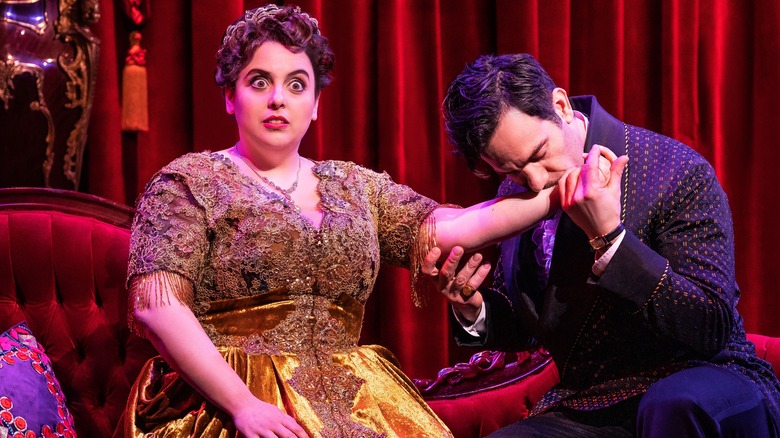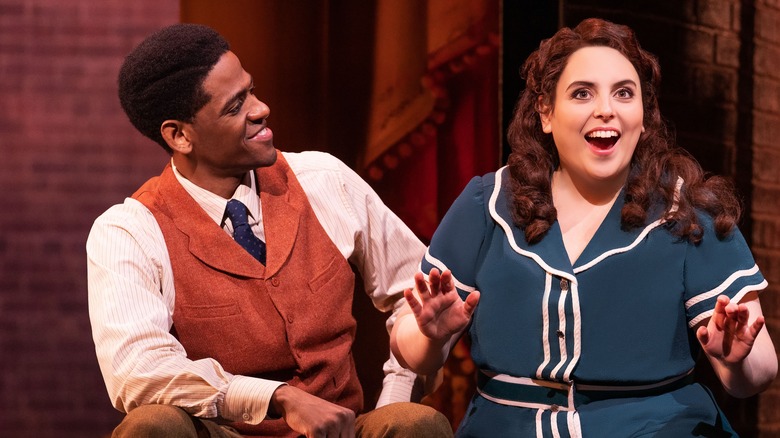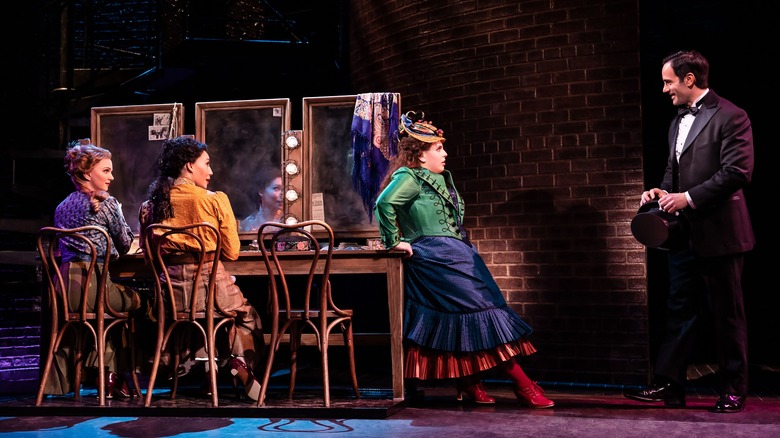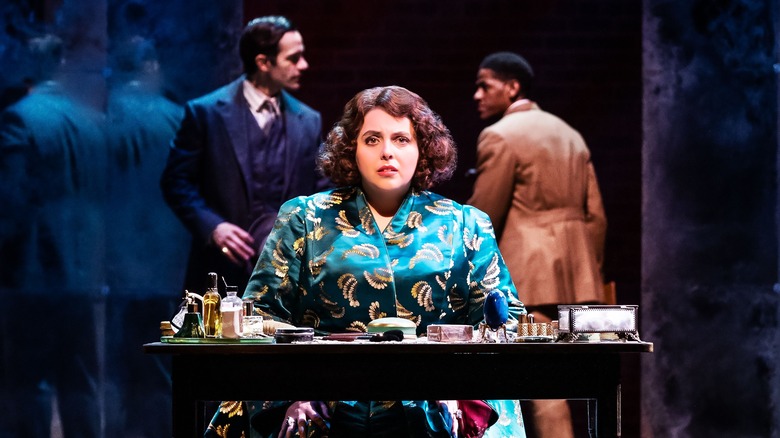Funny Girl Broadway Revival Review: Beanie Feldstein Doesn't Hit Every Bam But She Is Funny
The strongest scene in the "Funny Girl" revival arrives when Fanny Brice, embodied by Beanie Feldstein, attempts to wriggle out of the assigned role of a singing bride. Just as much as Fanny's protest for dignity reveals her internalized insecurities, she clocks in that her assigned lyrics "beautiful reflection of my love's affection" are not sincerely applied to her ("[They're supposed to laugh] with me. Not at me"). Through disobedience, Fanny improvises and screws with the original intents of the joke, thus raking in the laughs on her own terms. By casting Feldstein, a Jewish woman with a curvy body, this reimagines and elevates a familiar hilarity with dimensions.
In this biographical musical that loosely illustrates the subject's life, this sequence comes the closest to taking interest in its star vaudevillian comedienne Fanny Brice, her comedic process, and its relationship to her personal feelings. The rest of the musical either celebrates the humor of Fanny's performance on a showy surface level or backseats her stage career for her whirlwind marriage with gambler and entrepreneur Nicky Arnstein (Ramin Karimloo). And the latter is especially the enduring problem that surrounds the heart of its star.
Originally premiered on Broadway in 1964 as a project produced by Ray Stark (Brice's son-in-law), "Funny Girl" (music by Jule Styne and lyrics by Bob Merrill) was the vehicle for a then-21-year-old Barbara Streisand. William Wyler's 1968 movie adaptation of "Funny Girl" (an elongated film but centered by the lead's goofy firecracker performance) is the most accessible archive to experiencing Streisand's incarnate of the Funny Girl, a Fanny Brice interpreted rather than copied, for those not born in the era (and got the cash) to see Streisand on the Broadway or West End stage in the 1960s.
The notion of a revival on the Great White Way was deemed audacious and exhilarating. It's inevitable — and unfair — that the actress shouldering the role of Fanny Brice would be compared to the insurmountable monument to Streisand's performance. Starting with Streisand, the role is destined to be re-interpreted since "Funny Girl" reads as a general ode to a comic, namely a Jewish woman, who burnishes her confidence against naysayers, owns her beauty, and brews her humor on stage and within romantic situations. (In Joyce Antler's book "Images of Jewish Women in American Popular Culture," Streisand's performance is considered a social critique against stifling beauty standards against Jewish women, a "rebellion against the homogenized WASP norm [from the 40s to 60s] which had been as hegemonic in film as it had been in society.")
Before, Michael Mayer directed a 2015 West End revival on the Menier Chocolate Factory stage with Sheridan Smith as Fanny — and the 2018 pro-shot of Mayer's "Funny Girl" West End staging is viewable on BroadwayHD. Now "Funny Girl" is finally paraded on the Broadway stage with Mayer's direction and Feldstein, the "Booksmart" star and alumni of the 2017 "Hello Dolly" revival. For all its talents, though, Harvey Feinstein's revisal of Isobel Lennart's original book staggers the revival through a running time of two hours and 50 minutes and his pen ends up amplifying the musical's endemic problem: the Brice-Arnstein marriage.
Star power
Feldstein excels in connecting to the book and Fanny's stagestruck hunger, her insecurities, and the self-love confidence that she deserves better in life and she's gonna get it. When Fanny is subjected to "If a Girl Isn't Pretty" (a number about required showbiz beauty standards), her competition against traditional beauty standards is clear especially when she auditions among showgirls of the slender normative ideal. And Feldstein is a funny girl with irresistible zeal. She pulls silly buggy-eyed expressions of surprise and indignation and sneaks in micro-gestures — her wrist freezes midair in love-struckness when Arnstein kisses it.
But for all her charms, Feldstein's singing struggles. Her voice is far from dreadful (there's a bubbly color to it) but her labor becomes compensatory, haunted with a sense of cautiousness, in soaring pieces like "People" and the breakneck showstopper "Don't Rain In My Parade." Her punctuation of "Don't Rain In My Parade" lyrics becomes lost in her efforts, her "bite" and "bams" fall flat on impact.
Feldstein's true comic highlight (aside from the aforementioned "His Love Makes Me Beautiful") is "You Are Woman, I Am Man," where she decides to consummate her love for Nick. Her observational wit there is crystal clear with punctuated delivery — "Would a convent take a Jewish girl?" Unfortunately, when it comes to ensemble numbers, the orchestra overpowers the singing, blurring the lyrics and washing out jokes from being discernible — and, as someone who has an ADHD-related auditory processing problem, I have clocked in that has been discussed around theatre social media spaces.
As for Fanny's cohorts, Jane Lynch is a hoot as her mother, balancing affection with her brand of tough love. Peter Francis James gives Florenz Ziegfeld a professional austerity with a capacity for humbleness. Jared Grimes as Eddie Ryan, the dancer who becomes Fanny's romantic runner-up and stays her best friend, also steals the show with his triple-threat tap dancing (tap choreography by Ayodele Casel). His rapport with Lynch and Feldstein also infuses a lovable warmth. (It's mysterious that Fanny would fall for Nicky when Eddie is right there.)
Sadly, for an Act 2 that rests on believing in the spell of Fanny's ultimately doomed romance, Karimloo (a Broadway heartthrob who embodied the Phantom at the "The Phantom of the Opera at the Royal Albert Hall" concert) as Fanny's lover-then-husband Nick Arnstein does not spark a connection. He is attractive (cue audience applause when he popped up shirtless in Act 2), his singing voice is warm and soaring as expected. But for all the charm he exudes, he does not work toward gravity and leaves Feldstein to convince us that he's a man worth drooling over after a few conversations. His and Feldstein's marital chemistry only grows real the more Fanny and Nicky's marriage dissolves.
Suffocating stage choices
While this is a gorgeous-looking show, David Zinn's stuffy stage choices compete with spectacle. The symmetrical spiral staircases (representing the Brices' Lower East Side neighborhood) constantly occupy stage left and right, grinding the spectacle and shrinking the magnificence of the Ziegfeld stage. At center stage, a brick canister opens up to reveal the Ziegfeld stage, or backstage, or Fanny's home, encircling the scene around misty metal sheets. Ellenore Scott's showbiz choreography doesn't get room between the distracting spiral staircases and the canister effect. A distracting background detail, the canister is most blatantly suffocating for "His Love Makes Me Beautiful," the grandeur of Fanny's definitive performance crammed into a bottle. The fusion of Fanny's home origins and the stage only really works when a memory ballet swirls around her.
That said, lovely and unrestricted are Susan Hilferty's costume designs Fanny's gold-spangled evening gown and Ziegfeld showgirls paraded in crystalline white or butterflied banners.
An increasingly disinterested book
Revivals of Golden Age musicals run the risk of not escaping their time capsule — see "The Music Man" — rather than playing with the aged elements in interesting ways. Feinstein's book could not undo the lag of Act 2 where Fanny's failing marriage eclipses her comic career. From there, the musical's own interest in its heroine becomes undermined. For a tale about a woman subverting feminine ideals, owning her success, and self-validating her beauty, Feinstein's book and Mayer's direction also do little to conduct its own examination or encourage its audience to process the aged gender politics. When Mrs. Brice criticizes Fanny for making her husband feel small, the scolding plays as an indictment of Fanny's financial and artistic independence as a cause of her husband's behavior rather than a frustrating but realistically unjust critique against a woman of her standing. From the original production, the movie, West End, to this Broadway revival, Fanny and Nick are destined to mutually end their marriage yet Nick always expresses more consciousness of their ending than her, downplaying Brice's agency in letting him go.
"Funny Girl" is a duly entertaining letdown with enough star power to chug its aged book along. Feldstein may miss bams and whams but she is a funny girl worth loving. She deserves to be The Funny Girl in some yet-to-be original musical that's right for her caliber.
"Funny Girl" is playing on Broadway at the August Wilson Theatre.



